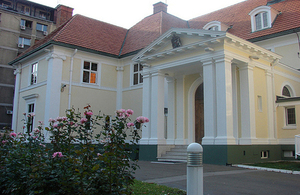Call for Project Concepts: Reuniting Europe programme 2015-2016 in Serbia
British Embassy Belgrade announces a call for project concepts under its REUNITING EUROPE programme for the financial year 2015-2016.

embassy
Background and context
The Foreign and Commonwealth Office, through its REUNITING EUROPE programme, supports partner countries with the reforms necessary for future EU accession or closer partnership with the EU.
Duration of projects
Proposed projects should run between 1 April 2015 and 31 March 2016.
Eligibility criteria
Project concepts are welcome from:
* National and local state institutions
* International and domestic civil society organisations (including international NGOs)
Submission of project concepts
Proposals are to be submitted in the form of project concepts, using the attached Project Concept form and Activity Based Budget form .
If successful at the concept stage, applicants will be required to complete a full project document, together with a comprehensive activity based budget. A request to provide a full project proposal does not constitute an agreement to fund a project, only that the Embassy is interested in receiving further details.
Project concepts should be addressed, in electronic format to: Vladan.Avramovic@fco.gov.uk
Deadline for submission is 20 January 2015
Priority issues
Project concepts that tackle one of the following priority issues are particularly welcome:
- To establish mechanisms and develop operational capacity to increase the efficiency, transparency, and public confidence in the judicial system, border management and law enforcement;
- To develop operational capacity to increase the effective and transparent fight against organised crime and corruption, including the requirement for inter-agency and cross-border co-operation to enhance effectiveness in combating organised and other serious crime leading to an increase in serious crime prosecutions in each country;
- To enhance capacity and commitment to integrate marginalised and minority groups in general in order to meet international human rights standards and safeguard the rights of vulnerable communities in the justice system;
- To support key non-governmental stakeholders so that they are demonstrably willing and able to contribute to the promotion of human rights and to the success of the EU integration process in their respective countries;
- To put in place structures, mechanisms and skills for the planning and co-ordination of the EU integration process. These include developing capacity in local and regional authorities to improve their chances of gaining access to, and effectively deploying, EU funds;
- To establish legal and institutional checks and balances in support of greater transparency in policy-making and implementation;
- To support the development and deployment of mechanisms and skills to enable citizens to engage with elected political representatives and so participate in local and national political processes, supporting countries increase their ranking in the Transparency International index;
- To improve media capacity to act as an agent for transparency and accountability; including activity in support of media freedom and wider freedom of expression;
- To support economic and financial reforms in Serbia, which spur the development of inclusive, rules-based market economies that meet the conditions for the EU enlargement.
Desirable types of projects (delivery indicators):
- Projects operating at the policy-making level, influencing the development of policy or the public and media debate;
- Projects which envisage a follow-up funded by host governments or other donors, which seek to leverage the value of the original project where viable;
- Project bids should provide clear evidence of how the project fits into future EU funding plans and therefore has the potential to leverage IPA (EU) funds after project completion;
- Successful project bids demonstrate: (a) evidence of consultation with other donors, (b) provision for sustainability, and (c) the capacity to engage host government Ministers or senior officials;